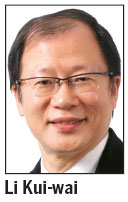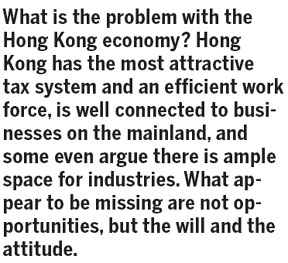Attitude matters more for economy
Updated: 2013-03-28 06:06
By Li Kui-Wai(HK Edition)
|
|||||||||
The Economic Development Commission (EDC) in Hong Kong existed in a similar form even before 1997. While the aim of the EDC is sound, it has not delivered anything extraordinary to the Hong Kong economy. Perhaps that's inevitable.

For a start, more or less the same group of people is invited to the EDC. After all these years of meetings and discussions, these individuals could have offered their best, if there was any, to the city by now. Second, the EDC is meant to be strategic and forward looking, but the content has continuously been confined to the same discussion groups and repeatedly related to the same industries or sectors. An even grander meeting, the Economic Summit held in 2007, stumped up only the suggestion that Hong Kong should be included in the nation's five-year plan, in the hope that there could be more business for Hong Kong. To reinvigorate the EDC is just "old wine in a new bottle", unless there is commitment to something new that leads people to "blink" their eyes.
Ever since the late Deng Xiaoping's economic reform in 1978 which laboriously introduced the market system on the Chinese mainland, Hong Kong has been a forerunner in aiding the mainland economy. The economic spirit of the "One Country, Two Systems" is that the mainland would like to see the post-1997 HKSAR economy become a "stable and prosperous" one, and Hong Kong's continued aid to the mainland economy would mean that the city will remain an asset, and not a liability, to the mainland. This necessarily means that Hong Kong will have to identify its own path of economic development, such that it can serve as a lesson for the development of the mainland economy.
The government acts on behalf of its people and does not own any assets. Its existence has a number of functions, including the maintenance of law and order, ensuring social security and macroeconomic stability. Government officials are not business people and do not have sound knowledge or experience of running businesses. The worst scenario is that the government uses public money in the wrong fields. Numerous examples all over the world have shown that nationalized industries are losers.
One has to accept the reality; that the ingredients of the Hong Kong economy are far different from the mainland economy. Consider one example. Foreign businesses need to approach the central or provincial government to establish business relationships on the mainland. However, investors do not normally need to approach the government in Hong Kong. It is the reliability of the business system in Hong Kong that investors cherish, not personalities, relationships or cronyism. In Hong Kong, investors expect a hands-off government policy. Business uncertainty rises when the government talks about its involvement in businesses and its intervention in the economy. The worry simply is: how far will it go?

What is the problem with the Hong Kong economy? Hong Kong has the most attractive tax system and an efficient work force, is well connected to businesses on the mainland, and some even argue there is ample space for industries. What appear to be missing are not opportunities, but the will and the attitude. Given that speculation in property and stocks are the only and most effective means to enrich oneself in Hong Kong, who would bother to invest in industries or businesses with longer gestation times for investment return? Statistics show that over half of all bank loans in Hong Kong are geared towards property or related borrowers. Former industrialists have all become speculators and property holders since speculation offered positive short-term investment returns in the 1990s.
Hong Kong needs to nourish a new generation of businesses elites that will utilize their skills, knowledge and technological know-how to establish manufacturing and service-related industries. Frontier medical devices, quality control and calibration, high-end fashion design and production, and education and training are all possibilities. It is true that the government had previously involved itself in the business of underground transport and theme parks. In general, the trend is to get involved in public utilities that help lower the residents' living costs. Some exceptions include Ocean Park and Disneyland. While both parks are meant to promote tourism in Hong Kong, the latter was launched during the time of the worst-ever economic recession in Hong Kong in the wake of the Asian Financial Crisis. One can understand that the government needed to do more in economic crises.
All the government needs to do is to invest more on infrastructure, research and development, and to promote a better quality of life, leaving the business sector to generate jobs and employment. Indirect assistance has been, is, and will be, the best channel through which the government can help to develop the city's economy. Examples include: encouraging the bus companies to use smaller and electric vehicles; corporatizing the Western Harbor Tunnel so as to reduce its expensive fare; encourage high-rise building owners to install solar energy devices on rooftops to save energy; invite foreign and mainland investors to utilize the tariff-free export items under the CEPA deal; and promote stronger social ethics through public campaigns and education.
The author is an associate professor of the Department of Economics and Finance at City University of Hong Kong.
(HK Edition 03/28/2013 page9)